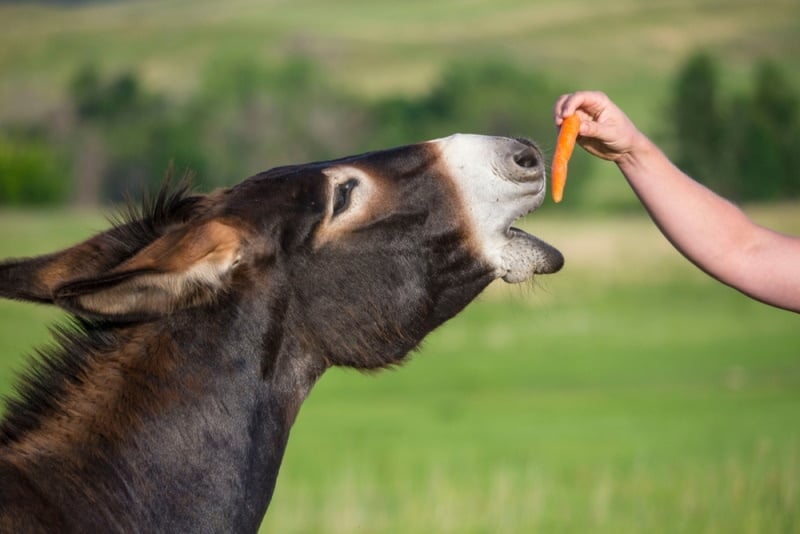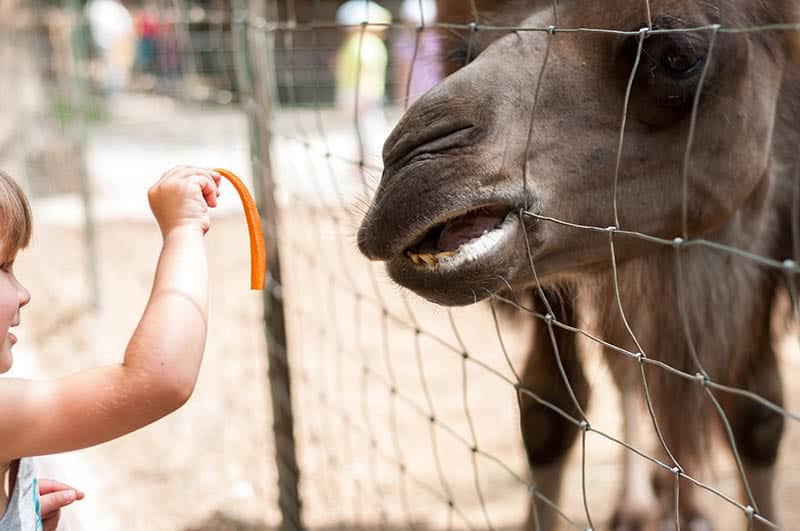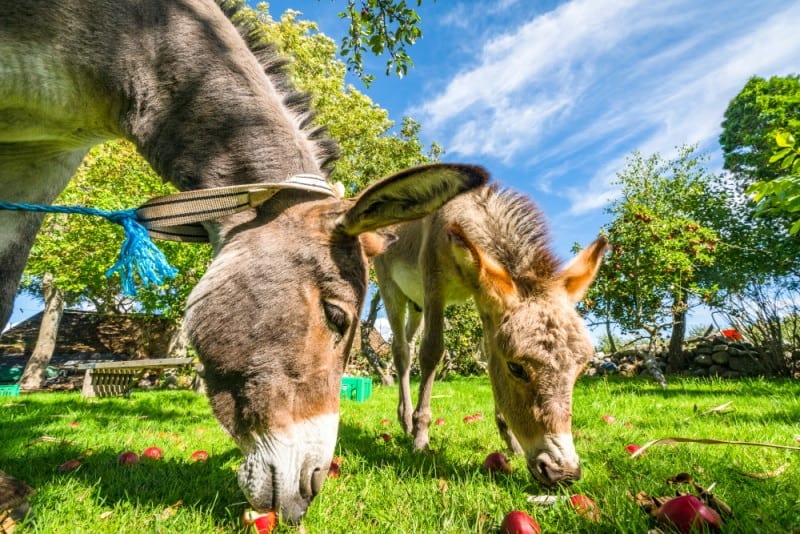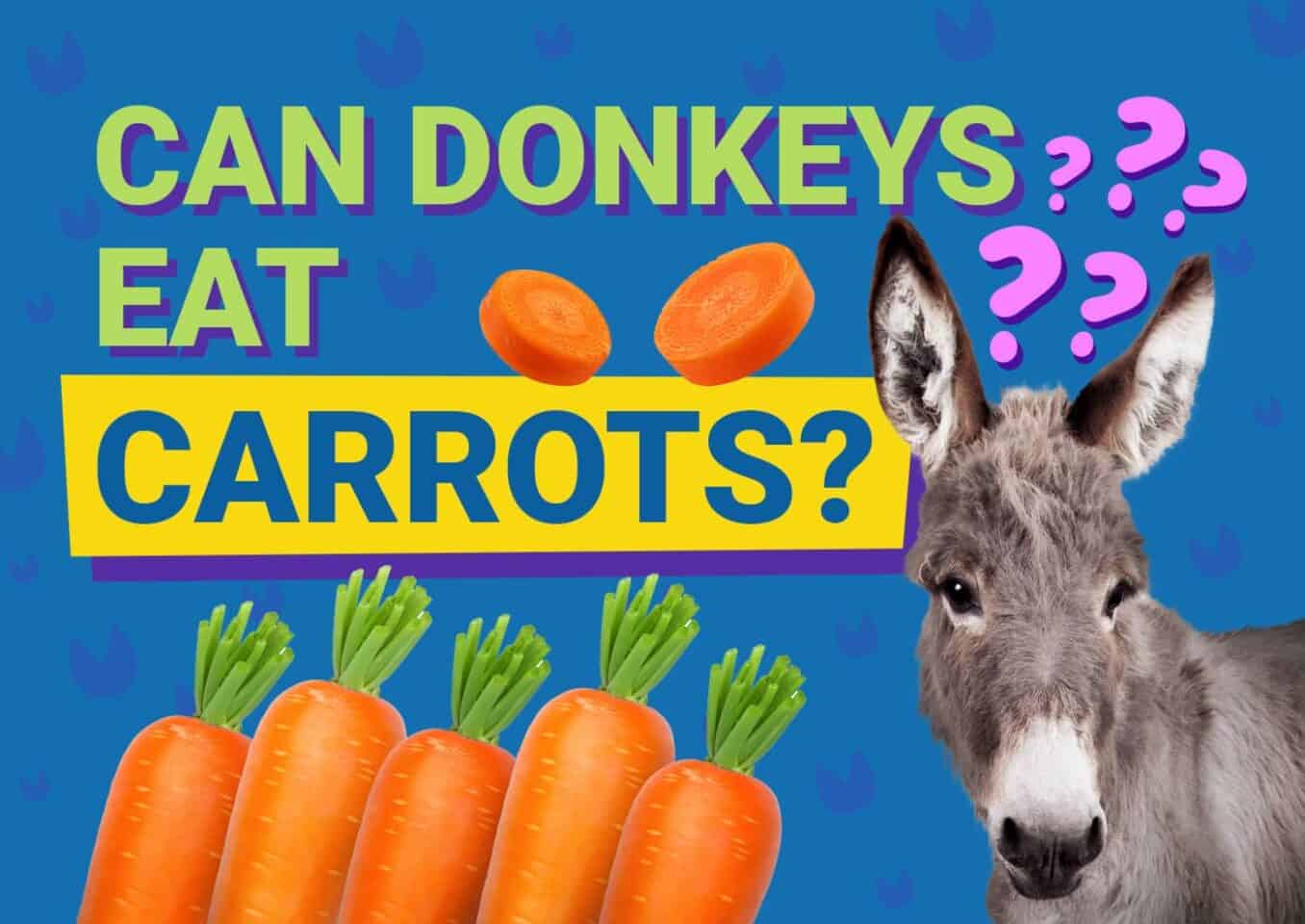If you have a donkey on your farm or land, one question you might have is whether they like carrots and, more importantly, if carrots are good for them. The answer is that donkeys do like carrots are they make a healthy, albeit occasional, snack. You should note, though, that carrots need to be cut into smaller pieces to prevent the risk of your donkey choking when they eat them.
Found worldwide, donkeys are unassuming beasts of burden that share close ties with horses and zebras. Of course, one of the most noticeable differences is the donkeys’ adorable floppy ears. Like their equine cousins, donkeys are social animals that like to hang around together in herds. Donkeys eat mostly grass, shrubs, and, in the desert, desert plants. They’re big eaters, too, and a single donkey can consume upwards of 6000 pounds of food in a single year. That’s 16 pounds of food per day, a massive amount compared to most land animals.
Knowing that donkeys like carrots and carrots make a good treat for them, you might have other questions about what to feed your donkey as a snack. How many carrots can a donkey eat in one day, for example, and what other foods can donkeys eat as a treat? If you do, the information below will be fun and fascinating. We’ll answer these questions and several more and give you real-world tips and advice about foods you can and can’t feed your donkey. To discover the answers and feed your dear donkey well, read on.

How Many Carrots Can a Donkey Eat per Day?
Equine experts recommend that no more than two carrots a day be given to your donkey. That’s because carrots, while a healthy snack, aren’t part of their regular diet. If your donkey is eating normally and consuming all the grass and hay they need, too many carrots can, not surprisingly, cause them to become obese. To prevent that and keep your donkey at a healthy weight, two carrots per day is more than enough.
What Are the Health Benefits of Carrots for Donkeys?

Carrots, which are highly nutritious for humans, also have several health benefits for donkeys. One of the best is that carrots contain vitamins and minerals, including vitamin C, vitamin A, potassium, and several others. Carrots are also high in fiber, which donkeys need in their food as it helps them stay regular.
One of the essential health benefits of carrots, at least as a snack for your donkeys, is that they’re low in sugar and very low in calories. Donkeys are predisposed to becoming chunky if you feed them too many snacks. Carrots are a better choice for your donkey than other snack foods. Carrots also happen to be one of the treats that donkeys seem to enjoy the most.
What Other Vegetables and Fruits Can You Feed Your Donkey as a Snack?
Several fruits and vegetables make decent snacks for your donkey. They include apples, bananas, turnips, pears, watermelon, oranges, grapefruit, pineapple, wild strawberries, pumpkin, butternut squash, cucumbers, celery, beetroot, and corn.
What Is the Donkey’s Natural Diet?
The typical food for donkeys is straw, hay, and grass, but they should only eat grass in moderation. One thing to remember is that a horse’s diet differs from a donkey’s. You can’t feed donkeys the same foods you feed your horses and expect them to stay healthy.
Donkeys are voracious eaters and constantly graze, eating anything they find. If they eat too much lush grass or rich hay, donkeys can become obese and suffer from other medical issues. Below are the best foods to feed your donkey to help them stay happy and healthy.
Barley Straw
Donkeys need a diet that’s high in fiber, low in protein, and low in carbohydrates. Barley straw fits all of these requirements perfectly and should be made available to your donkey whenever they want it. This is especially true in summer when your donkey’s diet should be 75% barley straw. In winter, that should drop to about 50%.
Grass and Hay
Depending on the time of year, either 25% (summer) or 50% (winter) of your donkey’s diet should be grass, hay, or haylage. Like barley straw, grass and hay are low in protein and carbohydrates. They are also excellent for your donkey’s teeth and easy to chew.
Equine Salt Lick
Like all mammals, donkeys need salt to survive. If they don’t get enough, you’ll find that they kick around in the dirt to find objects with salt on them. Donkeys then put those objects in their mouth to lick the salt off. To make it easier for the donkey to get salt, use an equine salt lick block. However, make sure it’s not a cattle salt block, as a donkey might try to bite one of those and damage its teeth.


Which Foods Should You Avoid?
Although safe and delicious for humans, some vegetables and fruits are toxic for donkeys and thus should be avoided as a potential snack.
- Meat of any kind
- Kale
- Cauliflower
- Brussel sprouts
- Lumps of sugar
- Broccoli
- Peaches
- Plums
- Alcohol
- Apricots
- Any fruits with large pits (aka stone fruits)
- Any cereal grain like barley or corn
- Tomatoes
- Pepper
- Potatoes
- Caffeine
- Bread
- Aubergine (aka eggplant)
- Garlic
- Onions
- Chocolate
- Processed human food of any kind
Make Sure Your Donkey Always Has Access to Clean Water
Like all animals, donkeys need water to survive and stay healthy. However, one challenge is that donkeys are picky about the water they drink. If, for example, the water you’ve given them is dirty or poured into a dirty container, your donkey may refuse to drink it. Also, donkeys won’t drink cold water, so putting their water somewhere it won’t get too cold is essential.
Should Vegetables Be Fed to Your Donkey Raw or Cooked?
Although some of the fruits and vegetables you can safely feed your donkey as a snack can be given to them cooked, equine experts recommend feeding all of them raw. In their raw form, your donkey will be able to digest most fruits and vegetables easier and get more nutritional benefits. It’s also worth noting that you should cut any fruit or vegetable snacks you give to your donkey into bite-size pieces to prevent choking.

Moderation Is the Key to Successful Donkey Snacking
Any snacks you feed your donkey should always be given in moderation. Donkeys constantly eat throughout the day and rarely refuse a snack, especially if it’s a fruit or vegetable they enjoy. However, if your donkey already has its nutritional needs met with hay, grass, and straw, feeding them too many snacks can easily cause them to become obese. An obese donkey can suffer from various health problems that are not only painful but also deadly. They include the following:
- Cardiovascular disease
- Liver disease
- Laminitis (aka founder, an inflammation of the lamina of their hooves which is extremely painful)
- Metabolic disorder
- Joint displacement
Can Donkeys Eat Banana Peels?
We mentioned earlier that one snack you can feed your donkeys is bananas, which are high in potassium and a good source of vitamin B6, magnesium, vitamin C, manganese, and especially fiber. What’s fascinating about feeding bananas to your donkey is that you don’t need to take off the peel! Not only is the peel safe for donkeys to eat, but they enjoy them quite a bit. Speaking of which, if you feed your donkey pieces of pineapple as a snack, you don’t need to remove the pineapple peel.

Final Thoughts
Can donkeys eat carrots? They certainly can, and carrots are an excellent, nutritious snack that donkeys enjoy. As with all snacks you feed your donkey, you should serve them in moderation and, according to experts, give them no more than two medium to large carrots per day. You can provide many other fruits and vegetables, but the same rules apply; feed them in moderation and ensure that they’re cut into bite-sized chunks to reduce the risk of choking.
Whichever snacks you choose to feed your dear donkey, remember that the best food for them is barley straw, hay, and, to a lesser extent, grass.
Featured Image Credit: William Hager, Shutterstock
